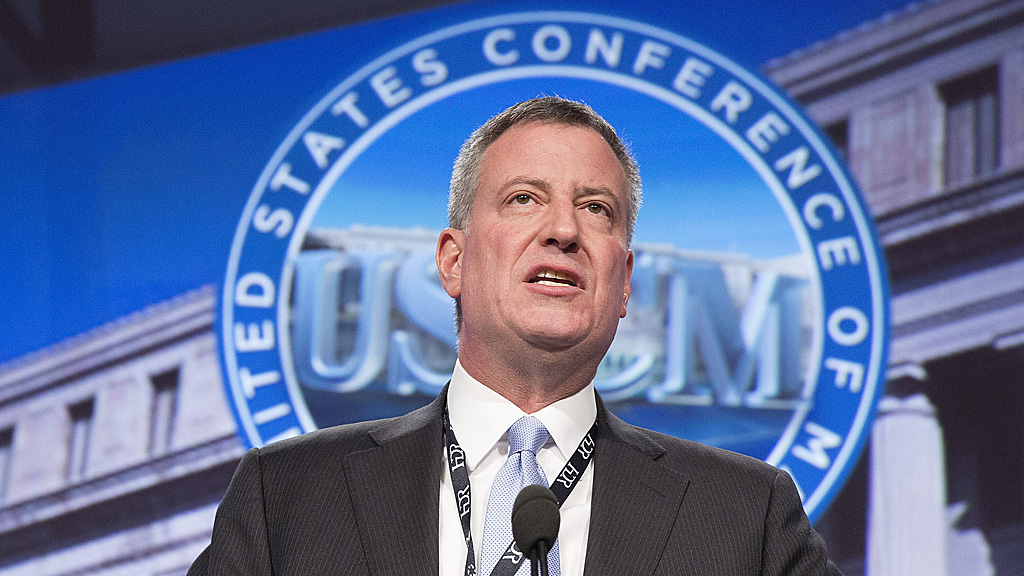NY mayor de Blasio pledges radical change
In charge of America’s biggest city, with a budget of £45bn, New York’s new mayor Bill de Blasio is less than a month into his job. So how is his fight against inequality going so far?
A Democrat has not been in charge for more than 20 years, writes Felicity Spector. But Bill de Blasio has been receiving a rock-star welcome from his fellow mayors, as he called for an “urban consensus” behind his push for affordable housing, education and public transport.
At this week’s US conference of mayors, he was propelled into star billing – with a radical message for his audience of peers: “For far too long, too many of the people we represent, far too many men and women all over this country, are grinding and struggling to make ends meet every day,” he declared.
It echoed the promise he made at his swearing-in: “City Hall is going to be on the side of working families all over this city” – and he has a policy agenda to match.
A tax on the wealthy to pay for free pre-school education for every four-year-old. He has already launched measures to expand paid sick leave to another half a million employees. He has promised to work for 200,000 new affordable housing units, and to rebuild trust and confidence in the police.

Powerful friends
De Blasio, who won votes with his charismatic appeal and equally charismatic mixed-race family, has some powerful friends: Bill Clinton, at the swearing-in, said he shared the mayor’s commitment to shared prosperity and opportunities, describing inequality as “not just a moral outrage, (but) a horrible constraint on economic growth”.
And just a few weeks into his term, New Yorkers seem happy enough. Some two-thirds, in a Quinnipiac survey, are optimistic about the next four years. Not that everything has gone smoothly, of course.
City Hall is going to be on the side of working families all over the city. Bill de Blasio, New York mayor
When the second major snowstorm under his watch hit New York, de Blasio was forced to defend himself against allegations that he had been slow to help out the ritzier Upper East Side, insisting “no-one was treated differently”, although later he admitted he could have done more.
And then there was Forkgate as the mayor shocked New Yorkers by tucking into pizza with a knife and fork – something he claimed he owed to his Italian heritage, fooling no-one.
Unique opportunity
Pizza habits aside, however, de Blasio has now become the most powerful city chief in the world, leading a city with 8.2 million residents and 54 million visitors every year.
He has the power to appoint commissioners and deputies to head the city’s key agencies, with influence over the education of 1 million children, as well as pioneering city policy for the next four years.
No elective office can match the New York City mayoralty as a source of direct action to improve everyday life. Mitchell Moss, New York University
His predecessor, Michael Bloomberg, used his position to push through major health drives, banning transfats and fizzy drinks, forcing chain restaurants to declare calorie counts and imposing a smoking ban.
Mitchell Moss, professor of urban policy at New York University, told the New York Times that it’s a unique oppportunity to play to a global stage. “No elective office can match the New York City mayoralty as a source of direct action to improve everyday life.”
Setting the tone
But there are limits. The man dubbed by the New York Post as “Che de Blasio” may have the support of the people, galvanising a generation of urban voters already energised by the populist message of the Occupy Wall Street campaign.
As John Cassidy pointed out in the New Yorker, the mayor has admitted he has no powers over some of the more powerful drivers of inequality, like globalisation, attacks on workers’ rights and the bonus culture on Wall Street and beyond.
What he can do, though, is set the tone for the city so good they named it twice. And next on his agenda: banning jaywalking and ending the “stop and frisk” procedure by police which he has likened to racial profiling.
Big plans, for sure: and the most powerful urban platform in the world, to make them happen.
Felicity Spector writes about US affairs for Channel 4 News
-
Latest news
-
‘Authentic Stupidity’: Ben Elton’s new show explores how idiotic human beings can be5m

-
Is Israel’s evacuation of Rafah the precursor to full scale invasion?3m

-
Eurovision: Non-binary artist wins for first time2m

-
Tens of thousands march in Georgian capital against ‘foreign agents’ bill2m

-
‘Russia’s number one goal is to get troops closer to Kharkiv,’ says Ukrainian security analyst4m

-




